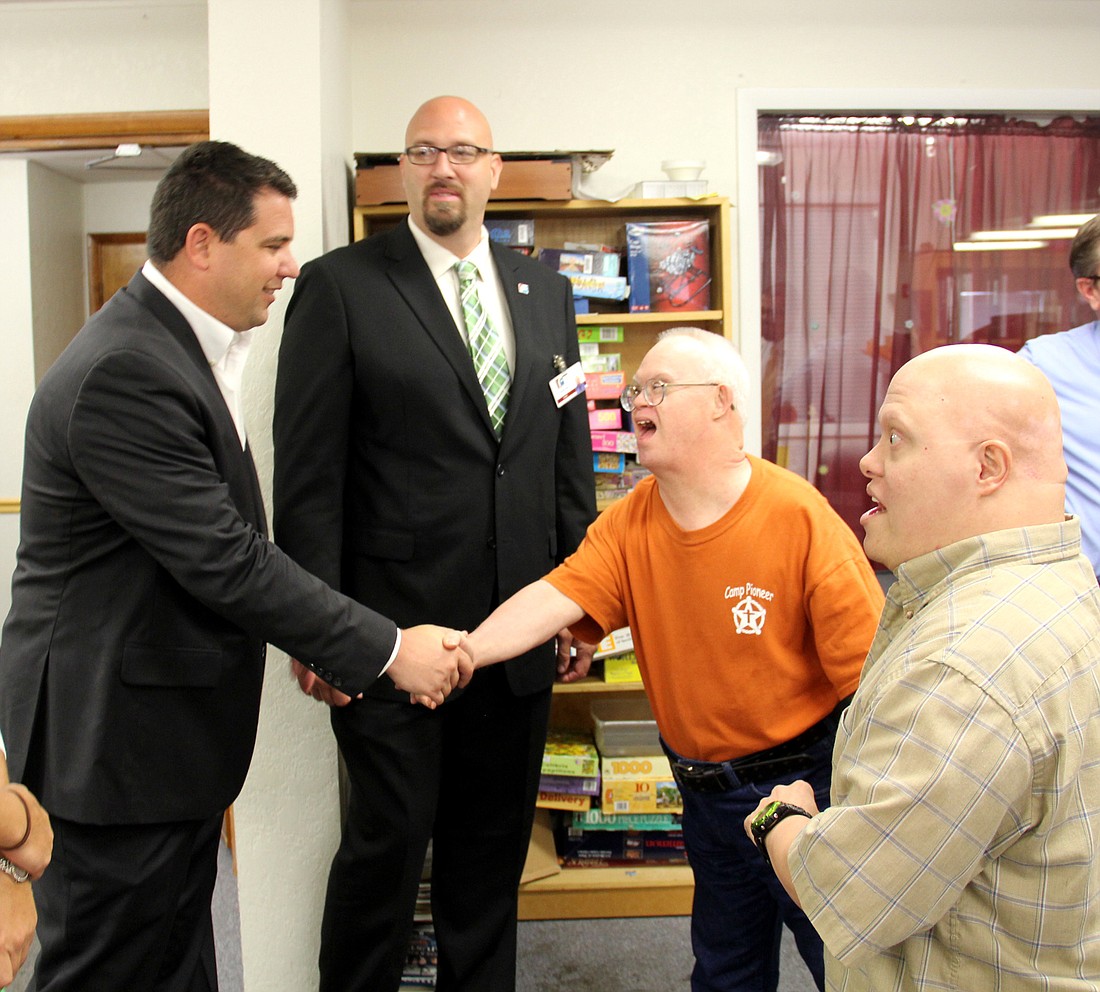- April 25, 2024
-
-
Loading

Loading

Flagler County School officials met with Senator Travis Hutson and Representative Paul Renner in a small conference room at the Flagler Technical Institute on Friday, Aug. 7, to discuss the future of Step-Up and Community Inclusion, programs for adults with disabilities.
We collectively, as a community, need to come up with one vision.” Flagler County School Superintendent, Jacob Oliva.
On July 1, funds that counties throughout the state depended on for years for their adults with disability programs, became a fatality in the state budget when, without warning, funds were cut.
The meeting location was appropriate – the people whose futures they were discussing, adults with disabilities, were busy in the room behind them. When the meeting concluded Hutson and Renner heard directly from those affected.
“Please don't take my paycheck away,” Linda, a client at Step-Up in Flagler, asked Renner. “I like it here, and I like to work.”
Renner told her that was what the meeting was about, and they were working on it.
The 45-minute meeting wasn't a blaming session, it was problem solving meeting.
The Step-Up program had been partnering with the Stewart Marchman-Act, and to qualify for the programs, the clients have to apply for the home- and community-based Medicaid waiver through the Agency for Persons with Disabilities.
The Agency for Persons with Disabilities was given $40 million for state programs as a whole, but there was some confusion as to how the money was being allocated.
FTI center manager Jeanne Elliott said she was told the APD grant was not a stop gap for the lost country grant, and that the most FTI would receive would be $10,000, for 18 clients, for 3 months.
“That was not the intent of the Florida Legislature,” Hutson said.
“I''d be curious to know what Stewart Marchman is doing with the other counties that we represent, and how they're getting dollars to those counties with these programs,” said Renner.
The loss of the funding eliminated the workforce program that allowed clients to earn a paycheck.
“This program is their life,” Elliott said. “When they were receiving a paycheck, they were so proud that they were working. Sometimes the paycheck was only $25, but that was so significant to them.”
McCarthy believes that many may be misinformed about the program.
“There are some people that may look at this as some sort of charity, and it's not that at all,” McCarthy said. “This is a viable environment for adults with disabilities to come into a setting that is safe and nurturing and that they enjoy. They are providing value to the community by enabling local businesses to get some work done.”
Medicaid dictates the ratio of client to staff, 1 trained staff member for 10 clients.
According to McCarthy the program allows parents, with adult children in the program, to continue to work themselves, rather than having to quit their job to care for them, or pay to place them in a group home.
The last year's state allocation for Flagler was $535,000.
“$535,000 might sound like a lot of money to a lot of people, but it's going to be greater if someone is out of the workforce, put into a group home, and now they are collecting a check for doing nothing, sitting at home, clicking channels,” said McCarthy. “That's not acceptable to us.”
“The process takes time, but the hard, cold facts are, we have to open the doors every day,” McCarthy said. “We can't wait on a 'maybe,' or 'in a couple of months.'”
Flagler County School Superintendent, Jacob Oliva explained the limitations on how tax dollars have to be spent.
“When we looked at the funding for the adult with disabilities, we had the grant to keep this program going,” Oliva said “We cannot appropriate K-12 dollars by statute which means we need to come up with enterprise funds to support this program. The revenue for July 1 for this program was $1,800 and it cost us $52,000. We can't sustain this. We are in crisis mode here. Those enterprise funds, those very few dollars we are able to generate cannot sustain all of these community needs. We want to keep these programs open, we want to keep the pool open, we want to serve the community and we want to serve these clients, but we need help.”
Seeing this as a community issue, a meeting of all of the jurisdictions and the school district was scheduled.
“We have scheduled a meeting with the cities and the county for Monday,” Oliva said. “I am meeting with the city managers of Bunnell, Palm Coast, and Flagler Beach, and the county administration, to talk about the challenges the school district is facing running adults with disabilities, and the swim and racquet club. We collectively, as a community, need to come up with one vision.”